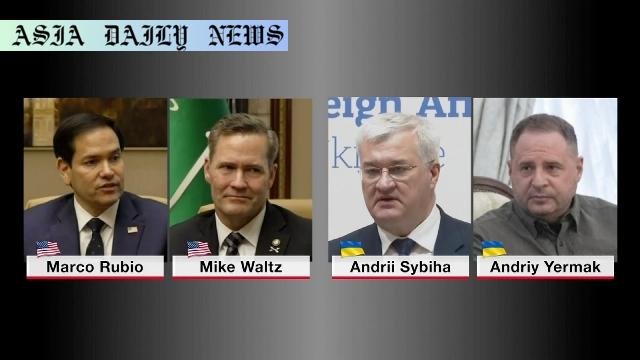Ceasefire: Senior officials from US and Ukraine to meet in Saudi Arabia for critical discussions on ceasefire and mineral deals.
Key Point 1: Senior US and Ukrainian officials are meeting in Jeddah, Saudi Arabia for ceasefire talks.
Key Point 2: The focus includes military aid, a minerals agreement, and a possible US-brokered ceasefire between Ukraine and Russia.
Key Point 3: The Trump administration is involving Middle East Envoy Steve Witkoff for discussions with Russia’s President Putin.

US and Ukrainian Officials Meet to Seek Path to Ceasefire
In a pivotal meeting scheduled this week, senior officials from the United States and Ukraine are set to convene in Jeddah, Saudi Arabia. The agenda focuses on critical discussions regarding a ceasefire in the ongoing conflict between Ukraine and Russia. The delegation will include US Secretary of State Marco Rubio, White House National Security Advisor Mike Waltz, and prominent Ukrainian leaders such as Andriy Yermak and Foreign Minister Andrii Sybiha. These mediations aim to navigate pressing issues like military aid, strategically crucial mineral agreements, and fostering diplomacy.
The geopolitical climate around Ukraine has strained the relationship between Washington and Kyiv. US President Donald Trump has expressed his dedicated pursuit of a ceasefire, but tensions surfaced during a White House meeting with Ukrainian President Volodymyr Zelenskyy last month. Both leaders failed to finalize an anticipated agreement over Ukraine’s mineral resources, and since then, the United States has temporarily halted military support for Ukraine. Despite these obstacles, Ukraine has reiterated its commitment to engaging “constructively” in the negotiations.
Focus on Mineral Agreements and Military Aid
An essential aspect of the Saudi-hosted talks will be determining the feasibility of finalizing a deal on Ukraine’s mineral resources, which are geopolitically significant for both nations. Secretary Rubio recently commented on the matter, emphasizing President Trump’s desire to see progress but signaling that immediate resolution is not mandatory. Meanwhile, Ukraine sees the resumption of US military aid as crucial for addressing the ongoing security challenges against Russia’s aggression.
The discussions may prioritize clarity about Ukraine’s stance on the ceasefire proposal and whether it aligns with US strategies. Additionally, Bloomberg and other outlets have highlighted growing diplomatic undertones surrounding the engagement of US Special Envoy to the Middle East, Steve Witkoff, and Russian President Vladimir Putin. These developments underscore the complexities surrounding ceasefire negotiations and the balancing of international expectations.
Trump’s Strategic Diplomacy through Special Envoy
The Trump administration’s decision to send Special Envoy Steve Witkoff to Moscow signals intensifying efforts to mediate the Ukraine conflict. Witkoff, known for his diplomatic involvement, has previously engaged with Russian officials on humanitarian grounds and broader considerations, including the detainment of American citizens in Russia. His role in last month’s discussions between the US, Russia, and Ukraine seems to position him as a crucial figure in advancing the ceasefire agenda.
Observers believe that negotiations involving Russia may shape the trajectory of the Saudi-hosted event, and Witkoff’s outreach could facilitate more profound dialogue. The inclusion of Russian President Vladimir Putin in these talks potentially opens the door to unprecedented collaboration, albeit requiring significant concessions on all sides.
Outlook: Will the Talks Yield Success?
The meeting between US and Ukrainian officials in Saudi Arabia represents a critical juncture in the broader effort to secure peace in Ukraine. Although challenges remain, including persisting disagreements on military funding and resource-sharing, creating an amicable roadmap for ceasefire represents a significant diplomatic milestone. Any breakthroughs in these negotiations could set the stage for a more stable geopolitical landscape and foster stronger partnerships between involved nations.
As the talks unfold, the international community will undoubtedly monitor the outcomes closely. A successful ceasefire agreement would not merely impact Ukraine and the US but also ripple across the global stage, influencing alliances, economic stability, and defense strategies during turbulent times.



Commentary
The Geopolitical Significance of Ceasefire Negotiations
The upcoming discussions between US and Ukrainian officials in Saudi Arabia demonstrate the importance of sustained global diplomacy in resolving modern geopolitical conflicts. With the Russia-Ukraine war reaching critical points, this meeting underscores a collective determination to seek avenues toward peace. It highlights the intricate interplay of international partnerships, resource control, and military strategies in addressing such complex situations.
A Balancing Act of Diplomacy
One of the key takeaways from the planned Jeddah summit is the strategic need to align diverse agendas. While the Trump administration appears to pursue a lasting ceasefire with Ukraine and Russia, hurdles like strained relationships and failed agreements reflect the challenging dynamics. Such talks demand trust, compromise, and transparency from all stakeholders. Russia’s strategic involvement, particularly through President Putin, only amplifies the critical nature of precision-oriented diplomacy to broker meaningful resolutions.
Hopes and Challenges Ahead
The Saudi-hosted discussion will undoubtedly attract broader international attention, especially to its implications for Ukraine’s stability and US foreign policy credibility. As negotiators enter the room, both Ukraine and the US have their reputations and interests at stake, making these discussions a pivotal test of diplomatic resilience. Should the talks falter or fail to yield progress toward peace, the repercussions could reverberate deeply across international political and economic landscapes.
Thus, the onus lies on participants to craft an outcome that stabilizes volatile dynamics without compromising long-term ambitions. Achieving such a balance would not only benefit the involved parties but also send a strong signal for the global pursuit of peace and cooperation.